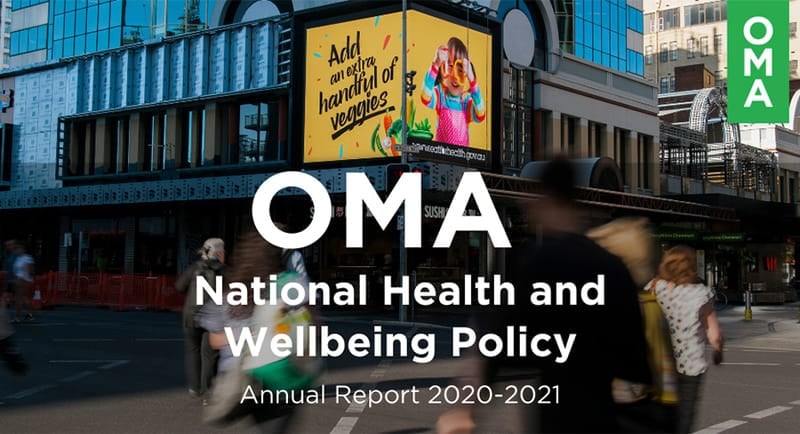The Outdoor Media Association (OMA) has released its inaugural National Health and Wellbeing Policy Annual Report. The report highlights the impact of the OMA’s national policy that aims to meet community expectations and support government efforts to tackle overweight and obesity in Australia.
The policy takes an active role in limiting the public’s exposure to discretionary food and drinks, by restricting the placement of this advertising within a 150m sightline of Australian primary and secondary schools.
Additionally, the Outdoor advertising industry pledges up to $3 million each year to a health promotion Outdoor campaign, as part of its commitment to educate and promote healthy eating.
The inaugural campaign, Add an extra handful of veggies, in partnership with the Australian Government Department of Health ran for four weeks in January–February 2021 and reached 9.4 million Australians. The report includes post-campaign survey data which shows that 86 per cent of parents who saw the ad said they were encouraged to include veggies in their meals or snacks, and 80 per cent said they were encouraged to make healthier choices for their children’s meals.
The Outdoor advertising industry’s post-campaign surveys on Outdoor for Good campaigns show that awareness and behaviour change rise with two to three campaign cycles. This is why OMA members are donating advertising space to a healthy lifestyle campaign annually.
“Our National Health and Wellbeing Policy is not a panacea to cure all ills, but what we have created will provide a better outcome than prohibitions and bans. We know it’s important that we play our part, and we are well-placed to promote healthy food and lifestyle choices on our nationwide network of Outdoor signs,” said Charmaine Moldrich, OMA CEO.
When it was launched in 2020, the OMA policy was a world-first, nationally consistent restriction on the placement of discretionary food and drink advertising around schools. The OMA is committed to ensuring the policy, and the wider self-regulatory scheme, is as robust as possible. From 1 January 2022, minor changes will be made to the policy to bring it into line with the Australian Association of National Advertisers Food and Beverages Code.
“Since the policy came into effect in July 2020, the feedback from government, industry and community has been overwhelmingly supportive. As we head into the second year of operation for the policy, we look forward to continuing to work collaboratively with key stakeholders and government on holistic and evidence-based solutions to help tackle the problem of overweight and obesity in Australia,” said Moldrich.
